Big Red Book
Celebrating television's This Is Your Life
Glen MOODY BEM (1909-1989)
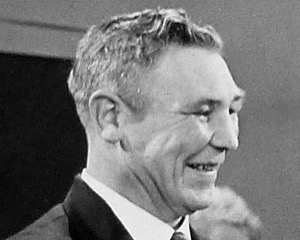
THIS IS YOUR LIFE - Glen Moody, former boxer, was surprised by Eamonn Andrews in the foyer of London's Café Royal, having been led to believe he was there to discuss plans for a charity event.
Glen, who was born in Pontypridd into a family of notable boxers, held the Middleweight and Light Middleweight boxing titles for Wales during the 1930s before enlisting in the Royal Engineers during the Second World War. After being mobilised in France and evacuated at Dunkirk, he was stationed at Clydebank in Scotland, where, having been involved in the rescue of a civilian in a recently bombed building, he was awarded the British Empire Medal.
After the war, Glen retired from boxing and settled in Fishguard, where he ran The Globe Inn. He then spent a few years in Australia, becoming involved in youth work before returning to Wales in 1957 to run The Criterion Hotel in Pontypridd, where he continued his efforts to encourage youngsters to take up sport by establishing a youth club.
programme details...
- Edition No: 187
- Subject No: 188
- Broadcast live: Mon 12 Mar 1962
- Broadcast time: 7.30-8.00pm
- Venue: BBC Television Theatre
- Series: 7
- Edition: 24
on the guest list...
- Dr Michael Leahy
- Bill Shanney
- George - brother
- Frank - brother
- Phyllis - sister
- Evelyn - daughter
- Charlie Chester
- Dilys - wife
- Ronnie James
- Jock Fraser
- Byron Landiet
- Ronald Goddard
- Ben - brother
- Betty - sister
- Emily - sister
- Liz - sister
- Barbara - daughter
- Ann - daughter
- Thomas Aloysius Bradley Filmed tributes:
- Joe Morgan
- Milton Jolly
- Dennis - brother
- Jimmy - brother
- Molly - sister
production team...
- Researcher: Alfred Draper
- Writer: Alfred Draper
- Director: David Croft
- Producer: T Leslie Jackson
- names above in bold indicate subjects of This Is Your Life
- with thanks to Donna Stephens for her contribution to this page, and to the staff at the Pontypridd Museum
from flyweight to heavyweight
the programme's icon
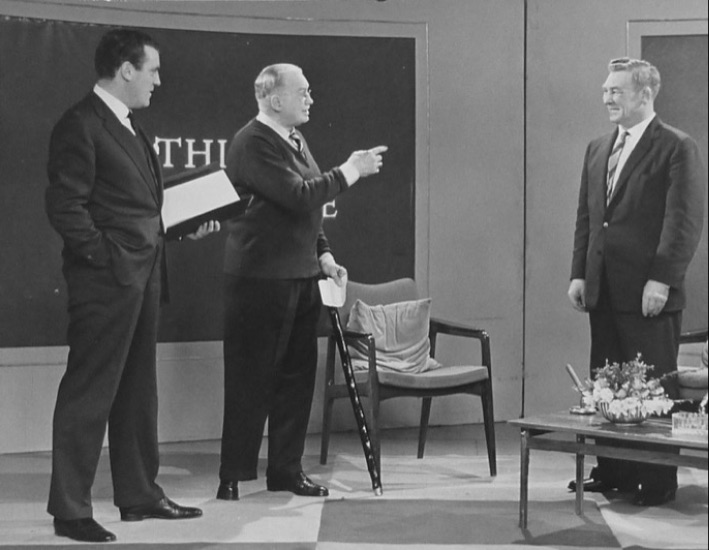
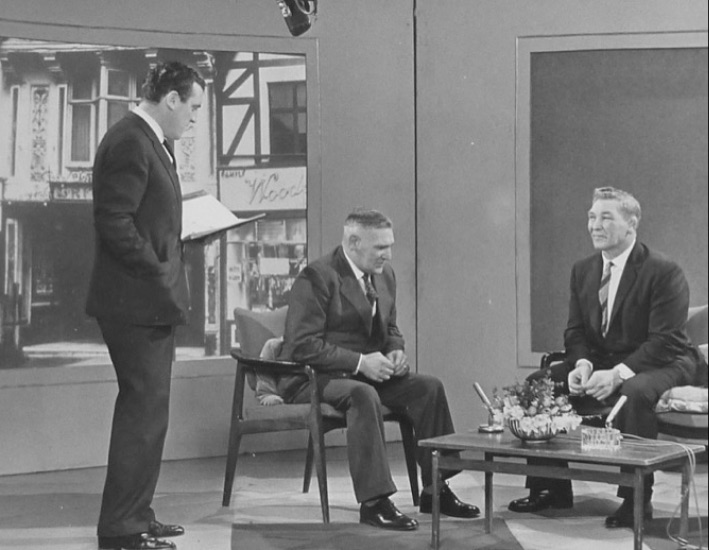
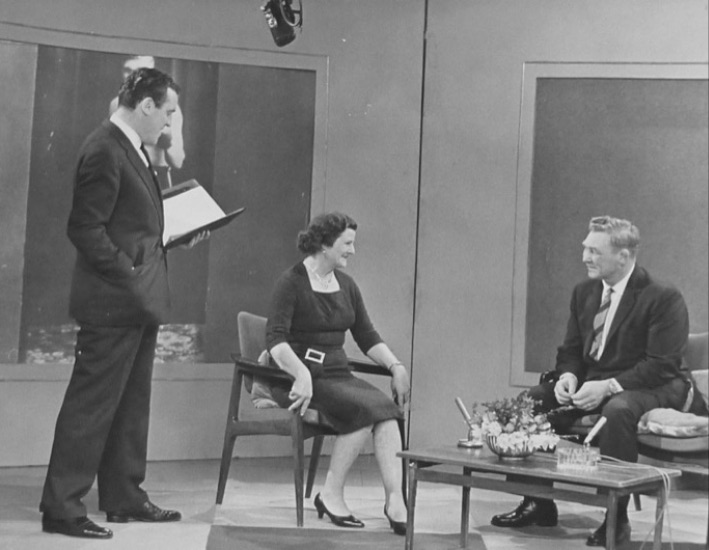
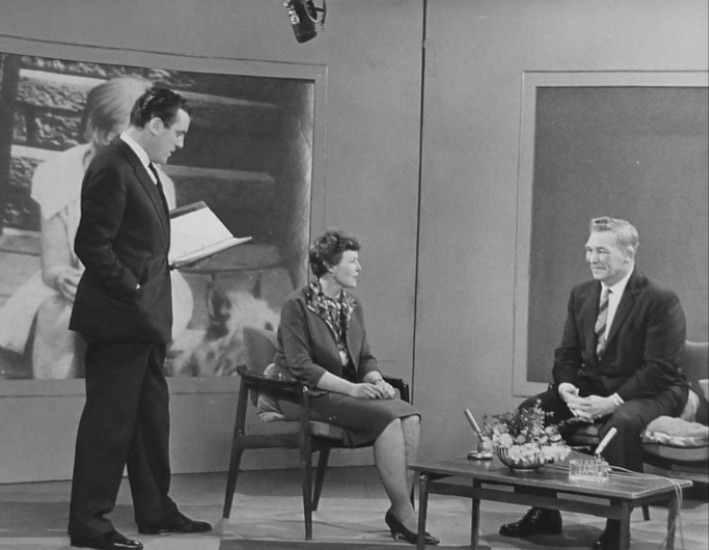
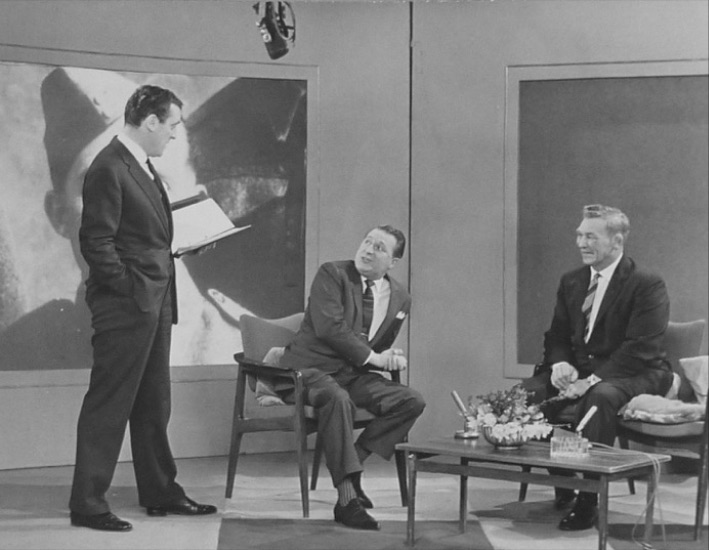
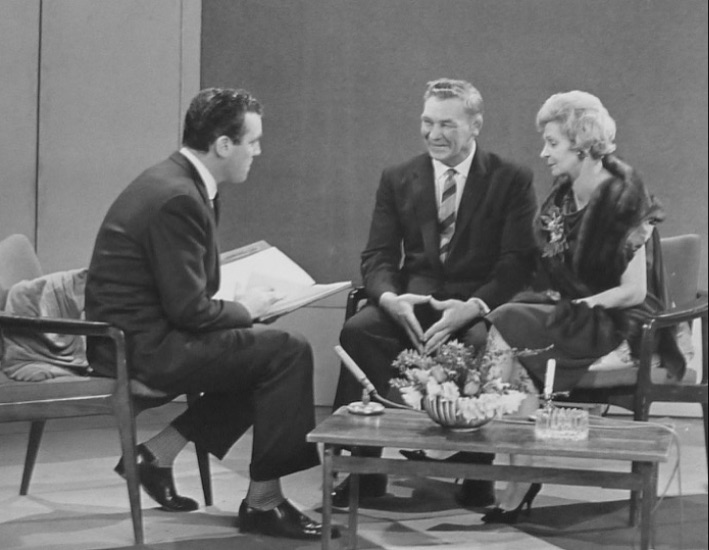
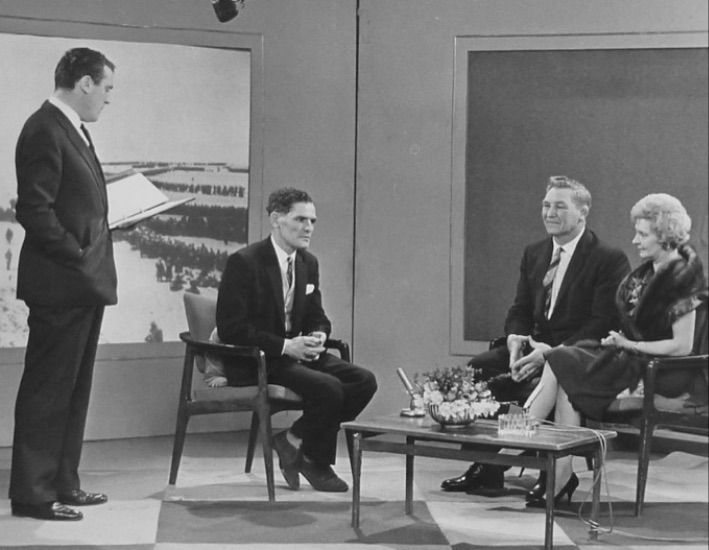
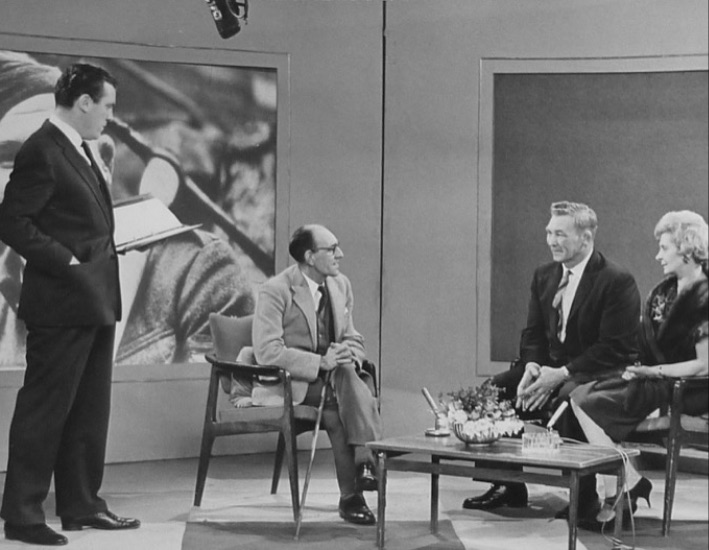
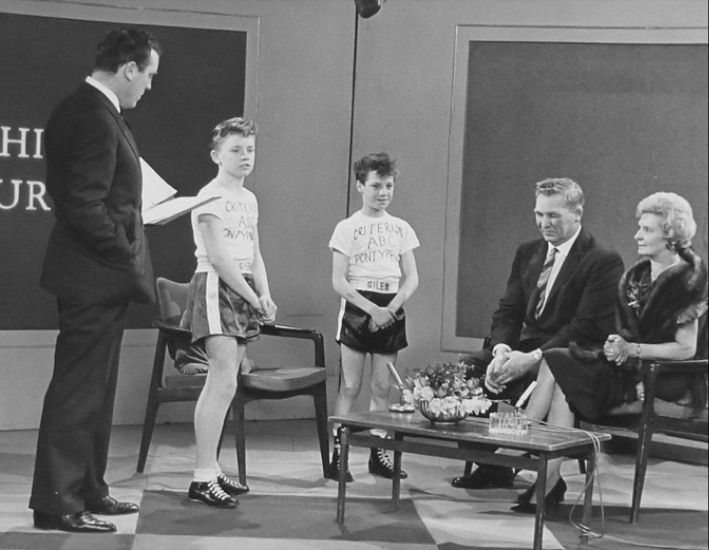
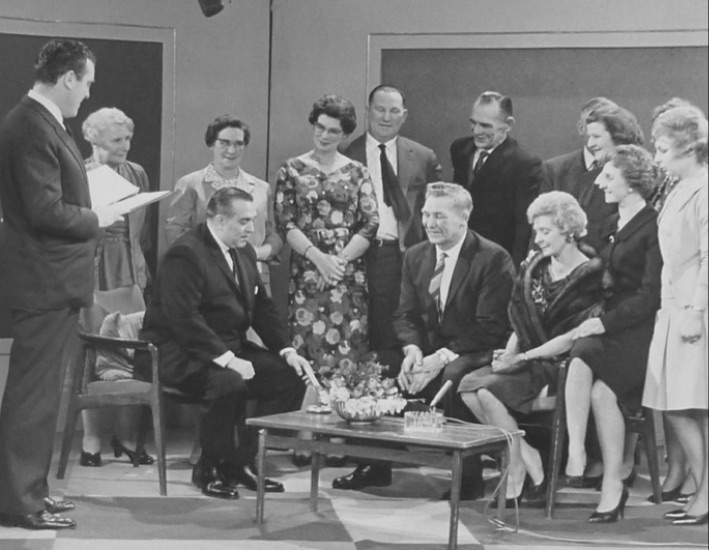
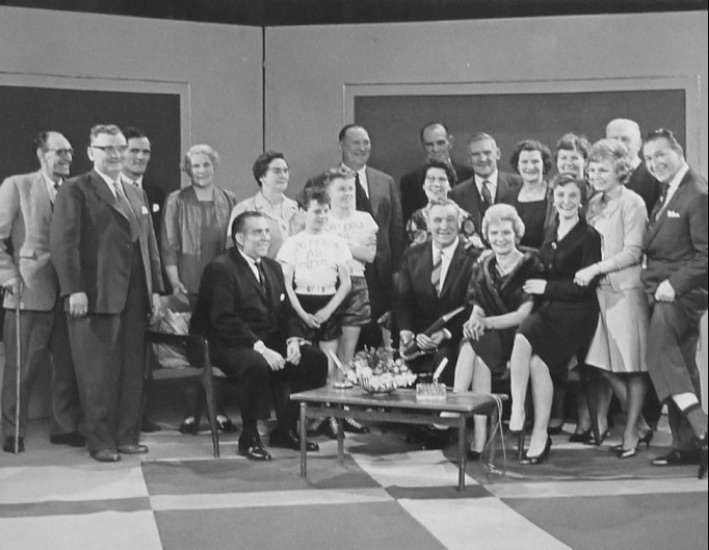
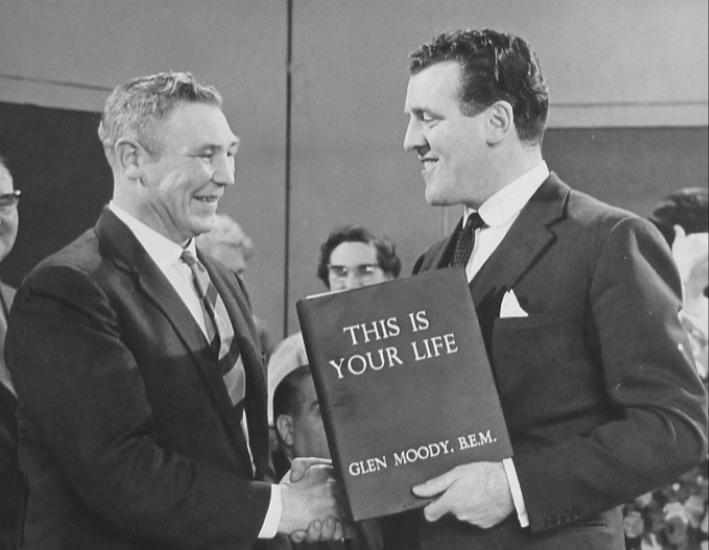
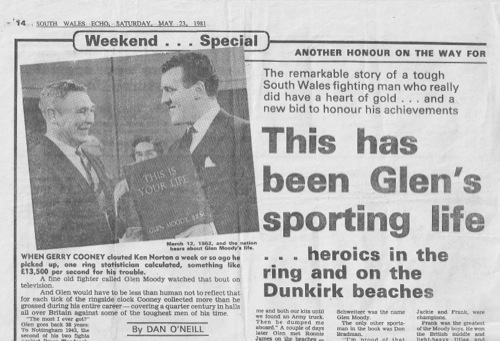
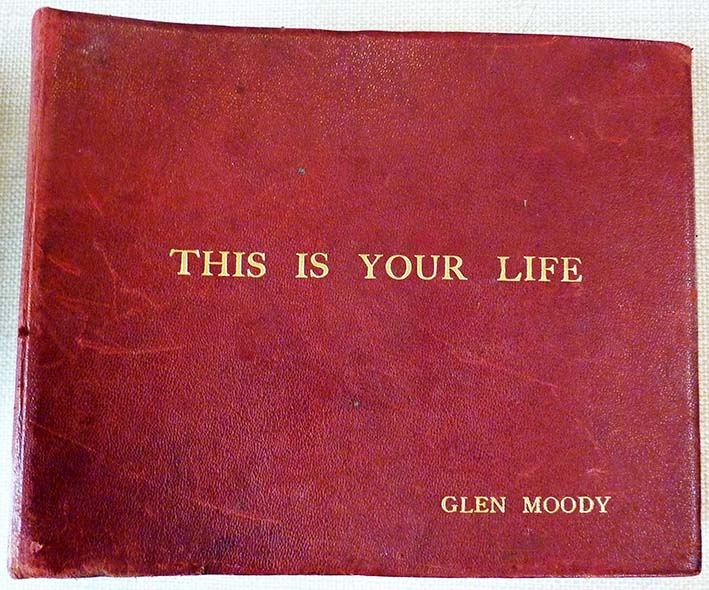
Photographs of Glen Moody This Is Your Life - and a photograph of Glen Moody's big red book
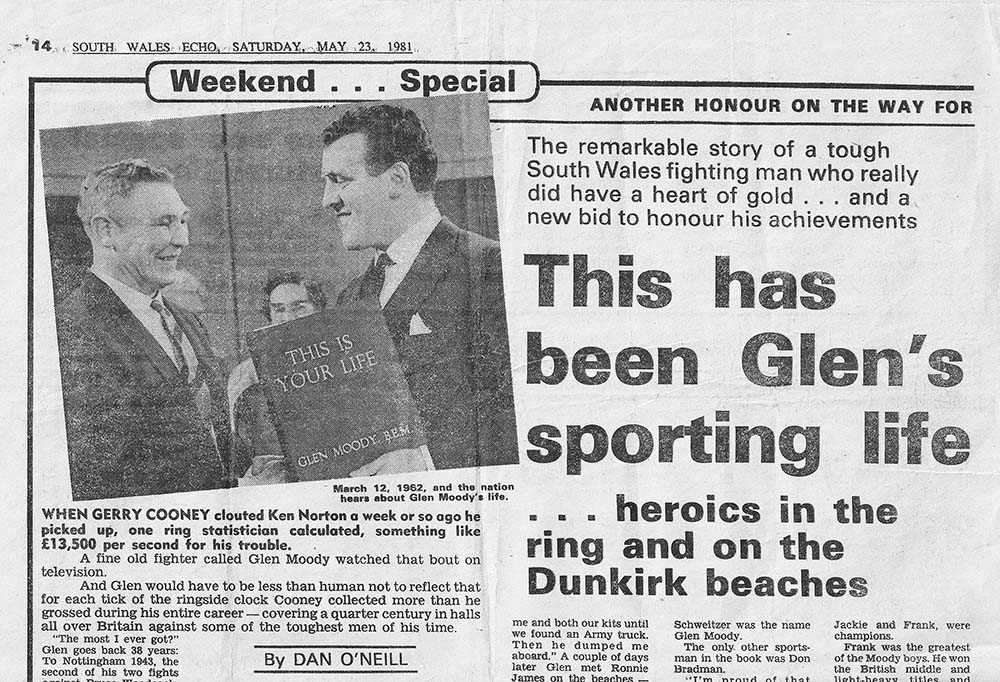
South Wales Echo 23 May 1981
Weekend... Special
ANOTHER HONOUR ON THE WAY FOR THE MAN EAMONN ANDREWS ONCE MET...
The remarkable story of a tough South Wales fighting man who really did have a heart of gold... and a new bid to honour his achievements
...heroics in the ring and on the Dunkirk beaches
By DAN O'NEILL
When Gerry Cooney clouted Ken Norton a week or so ago he picked up, one ring statistician calculated, something like £13,500 per second for his trouble.
A fine old fighter called Glen Moody watched that bout on television.
And Glen would have to be less than human not to reflect that for each tick of the ringside clock Cooney collected more than he grossed during his entire career – covering a quarter century in halls all over Britain against some of the toughest men of his time.
"The most I ever got?" Glen goes back 38 years: To Nottingham 1943, the second of his two fights against Bruce Woodcock, later to become British Empire and European heavyweight champion. "I got £120."
Woodcock, in his autobiography, called Glen one of the toughest men he'd ever met – and thanked his man a dozen years older for the boxing lessons handed out. Glen fought Woodcock 12 years after winning the Welsh middleweight title in 1931 – and for that one he got all of £12.
Not the sort of purses to offer security when the last fight is over. Which is why, next month, friends and admirers of Glen Moody – and they are legion – will be giving him his first ever Testimonial.
"What we want," says Bob Manley, who is handling the event, "is to raise a bonus for a man who gave so much to Welsh and British boxing."
Up popped Eamonn...
Glen is a bit embarrassed by the prospect. He's 72 now, living with his wife of 50 years Dilys in a council flat in Rhydyfelin, and confesses that he feels somewhat shy about trying to persuade his old fight mates to pay £1.50 for a ticket.
"You deserve everything you can get," says Mr Manley. "Don't you be soft."
Well, when you're living on just over £40 a week a testimonial can be very welcome indeed and Glen agrees to contact people who might be interested.
"Get hold of Charlie Chester," says Bob Manley. "You know him don't you... and he's got a show on the radio."
Ah yes! That brings back some memories for Glen.
March 12, 1962. The foyer of London's famous Café Royal. Glen Moody walks in to talk over a charity performance when up pops Eamonn Andrews to say "Glen Moody, BEM, This Is Your Life."
The BEM? He got that for rescue work and bomb disposal during a blitz on Clydesdale where he was stationed in 1941. Anyway, back to the Café Royal where Eamonn wheels on the guests and one of them is Charlie Chester who once played the piano at nights in a Fishguard public-house that just happened to be run by Glen Moody.
"Glen was away in the Army most of the time," Charlie said. "But Dilys ran things – she kept an enormous mallet behind the bar in case of trouble."
Glen's still got the script of that old This Is Your Life show and it tells a lot about the man whose face, that March evening, became familiar to the nation.
Eamonn Andrews summed it all up.
"Glen Moody, as a boxer your prowess at putting people on their backs is famous. Tonight we are more concerned with your remarkable capacity for putting people on their feet."
"In many parts of the world," Eamonn went on, "there are people who in times of danger or need, have had reason to bless the day they came face to face with big Glen Moody."
Well Glen fought at around 12 stone and even now is a fit-looking 15 stone – but that's not really big. Still, Eamonn was right about the rest. And in they came: The man who trod on a landmine on the hills above Fishguard, carried down by Glen and into hospital; the man named Joe Morgan, who Glen found lying on the road after an air attack in France, on the road to Dunkirk, 230 pieces of shrapnel in his body.
Joe Morgan, too ill to go to the studio, spoke from his home in Llanelli. Glen had picked him up, carried him to a hospital train, and, said Joe, "stood by me for the eight days it took to get to Dunkirk." On those beaches Joe kept passing out – "but whenever I came to there was Glen beside me."
On the retreat to Dunkirk "another comrade is to bless the strength and courage of Sergeant Moody." Out came Ronnie James, discovered by Glen at the roadside, feet blistered, bleeding and swollen.
"He ordered me to climb on his back... he carried me and both our kits until we found an Army truck. Then he dumped me abroad." A couple of days later Glen met Ronnie James on the beaches – and presented him with "a beautiful pair of carpet slippers."
'Me and Gandhi...'
Someone else who Glen picked up was on that show as well. To reveal a bit more of the gentleness behind those fearsome fists.
Evelyn Thomas was seven when Glen found her in 1934 wrapped up and sleeping in his overcoat at the local gymnasium. She used to go down to watch the fighters – "But Glen Moody was always my idol." The other boxers, said Evelyn, "used to snort and stamp like bulls. But he was always so quiet. And he always found time to answer all my hundreds of questions."
Glen went to see Evelyn's mother. He learned that Evelyn was going into a home. He immediately talked to Dilys and they adopted Evelyn there and then.
"And in time everyone thought I was their daughter. People used to tell me I got more like my father every day and that gave me a marvellous feeling because Glen Moody is the most wonderful person in the world."
That was said in 1962. Evelyn is dead now but her children are "Moody grandchildren".
So This Is Your Life revealed, in effect, another side of Glen Moody's life.
As did a book published a year later – A Year Book of Modern Heroes.
There in company with such names as Albert Schweitzer and Mahatma Gandhi was the name Glen Moody.
The only other sportsman in the book was Don Bradman.
"I'm proud of that book," says Glen. "Think of it... me and Mahatma Gandhi."
But as he sits in his flat the memories are all about boxing.
He reckons he can't remember all the fights he had, although one historian credits him with 99. That doesn't tell the story, says Glen. He was a fighter from the start.
He was born in East Street, Pontypridd, on March 10, 1909, one of a family of 13 children, seven of whom were sons. Of these sons six turned to boxing and three, Glen, Jackie and Frank were champions.
Frank was the greatest of the Moody boys. He won the British middle and light-heavy titles and fought the world's best. Frank Moody, the boy from Pontypridd, shared the ring with such immortals as Harry Greb, Joe Gans and Tiger Flowers before returning from his third American tour to draw with and then beat Tommy Farr in 1935.
Glen talks often of brother Frank, who died in 1963. And of Jackie, too, who came out of the forces to die in a mining accident in 1945 and might have been the best of all.
When Frank boxed an exhibition in Crumlin long years ago five of his brothers appeared on the same bill. So Glen grew up to the game and never fought as an amateur, gratefully accepting a "nobbin" for every early fight. As he once observed, it was hard to live up to the reputation of being "Frank Moody's young brother." The fans expected miracles.
Glen burrows through boxes of cuttings and albums of old photographs and the years since the start melt away. Those first fights brought in a pound or 30 bob. The Big Money meant £22 10s for 15 rounds against the best in the business - with a purse of £28 10s for the Welsh middleweight title to be shared between both boxers.
Gym for youngsters
Out of that, Glen recalls, a third went for the referee and a third for gloves. Leaving less than a fiver for the fighters. Shades of Cooney's £13,500 per second!
It's difficult to realise that this fit-looking veteran of the world's most testing trade has, in his time, done battle with British legends. No one who has never fought can begin to realise what it's like to go out against a man like Jack Casey whose sworn intent is to hammer you flat.
They called Jack Cast Iron Casey and he could take a punch and hand one out as well. A Sunderland lad. A hard North-Easterner. Sadly, towards the end of his life, he'd bet a pint in dockside public-houses that no one could put him down and there were some who gently nudged his chin and paid and others who tried hard. But Jack, who died in January 1980, didn't go down.
He beat Glen three times in 1932 and when the frost puts icing on the mountains outside the windows Glen can still feel the wounds from almost 50 years ago.
Glen ran the Fishguard public-house for a while before emigrating to Australia where he was chief instructor with the Police and Citizen Youth Club movement. He stayed four years, founding a youth club in Ballarat, New South Wales – but the pull of boxing was strong, and in 1957 Glen returned to Pontypridd to take over The Criterion.
Again Glen started working with youngsters – building a gym at the back of his hotel with room for 50 boys a night to train. After the public-house Glen worked for the T B Fish bookmaking concern but for the past seven years he's been retired.
All that is best...
In the mid-70's he helped start the Welsh Ex-Professional Boxers' Association and he's now the president and still actively involved.
"We do a lot for charity," Glen says. "We try to help."
But Glen has never thought about helping himself - and still feels diffident about it.
Since retiring Glen has helped a lot of young fighters. He's done a lot of work with youngsters. He still feels there is enough potential in the Valleys to produce another generation of great battlers.
At 72 he's a trifle too old to get involved himself. Even though he looks capable still of blasting the hopes of some of the younger middleweights - a powerful old man is Glen. He wasn't expecting much more from boxing.
But the Testimonial is on and the tickets will be sold.
And Mr T B Fish, who thinks that Glen Moody represents all that is best in the Welsh boxing of the great days, has put his organisation at the disposal of the Testimonial Committee.
"If anyone wants to send something to show their appreciation of what Glen has done," he says, "my office is ready to handle it all. There'll be nothing off the top – everything will go to one of our finest fighters."
So next month Glen gets embarrassed all over again – when people say nice things about him just as they did on This Is Your Life almost 20 years ago.
Series 7 subjects
Max Bygraves | Mario Borrelli | Alastair Pearson | Brian Rix | Derek Dooley | Elizabeth Twistington Higgins | Sandy MacPhersonRonald Menday | Harry Day | Peter Finch | Charlie Drake | Timothy Cain | Isabella Woodford | David Park | Sefton Delmer
Coco (Nicolai Poliakoff) | Jenny Gleed | Arthur Davies | Tom Evans | David James | Kenneth Horne | Marie Rambert | David Butler
Glen Moody | Kenneth Cooke | Tom Breaks | Dora Bryan | Bob Oatway | Acker Bilk | Hester Meakin | Joe Filliston | Ellaline Terriss